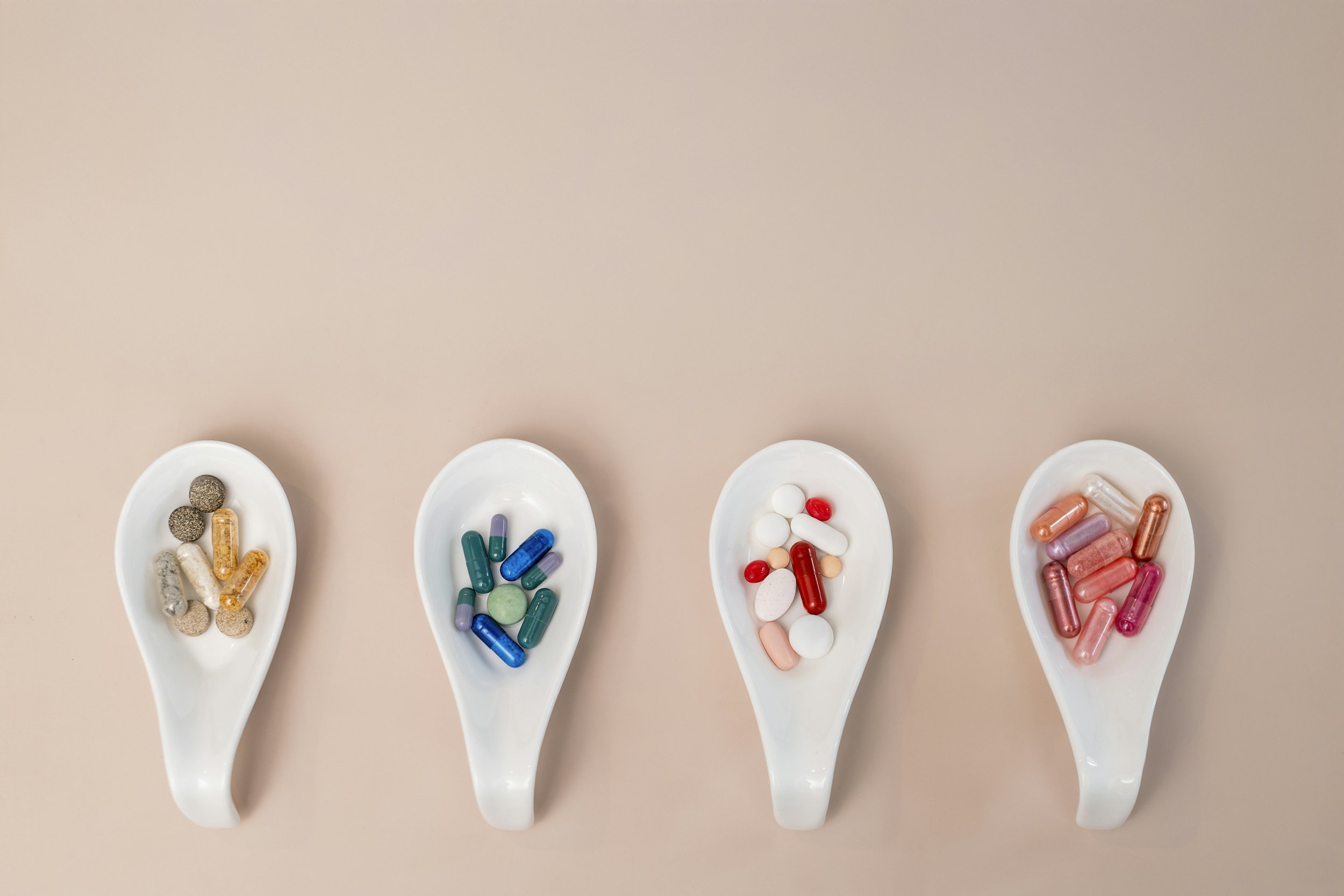Dietary Supplements: How to Select High Quality Supplements & Stop Wasting Your Money
The dietary supplement industry makes almost $200 billion per year, promoting all types of wishful thinking from anti-aging to total body detox to fast-tracking gains at the gym. And who wouldn’t want to invest in a habit as easy as popping a few little pills each day if it gets you closer to your goals? Sounds like a great deal, right? Well, maybe not.
Don’t get me wrong, supplements can be a hugely supportive catalyst for healing. I use them often in my practice. But there’s a caveat: not all supplements are created equal. This blog post is here to give you a peek behind the curtain of the somewhat shady supplement industry. By the time you finish reading, you’ll feel equipped to make better decisions when selecting supplements that impact both your body and your bank account.
Over 80% of Americans report taking at least one dietary supplement a day in order to promote health in one way or another. You may be one of them! And every day when you hold those little capsules in the palm of one hand and a glass of water in the other, you think to yourself “I’m such an adult. Look at me taking care of my health! L’Chiam!” However, what do you really know about that supplement? How can you be sure that it contains the ingredients that it states on the label? And if they in fact contain said ingredients, how do you know the claims about them are even backed by evidence?
A bit of background….
Prior to 1994, there was virtually no governmental regulation of dietary supplements in place. The Dietary Supplement Health and Education Act of 1994 put a few regulations in place, albeit half-assed at best. Here are some highlights you need to know about the DSHEA:
Supplements defined as their own category under food products, not drugs.
All supplements must be labeled with the term “dietary” or a similar equivalent like “herbal” or “calcium” preceding the word supplement.
Anyone who decides they want to start a company that manufactures dietary supplements can just go for it – there is no vetting process and no pre-approval of their formula is necessary unless they are introducing an ingredient that has never been on the market before 1994. Any and all combinations of dietary supplements that were already on the market prior to 1994 are considered GRAS (Generally Recognized as Safe).
It is the responsibility of the manufacturer to be in compliance with the regulations of the law and follow Good Manufacturing Processes (GMPs).
While the FDA was put in charge of regulating product safety and health claims, it does not have any role in overseeing a dietary supplement or manufacturer until after the product hits the market. And even then, they will not usually investigate the product unless there is proof presented that it may cause harm or is adulterated. Therefore, we are the guinea pigs. Think of the FDA as in the harm removal business, not the safety business.
The FDA does not publish a list of companies without violations and does not guarantee the safety of any dietary supplement.
Sounds like the Wild Wild West, right? Well, it gets worse. It took 20 years (from 1994-2013) for the FDA to get its GMPs in order. When they did their first audit in 2012, a whopping 70% of manufacturers were cited for GMP non-compliance.
Examples of non-compliance:
Ingredient safety: i.e.dangerous heavy metals in products
Adulteration: products with contaminants, non-approved dietary ingredients and pharmaceuticals
Quantity of ingredients different than what is on the label
Dietary ingredients in product that are not listed on label whatsoever (filler)
Failure to test products appropriately
Failure to keep adequate or accurate records of testing products
While these non-compliance numbers have improved, the level of non-compliance remains alarming. For example, of the 598 dietary supplement companies in the US and abroad that were audited by the FDA from 2018-2019, 52% in the US and 48% of abroad companies were cited for non-compliance. Unfortunately, the way the laws work, even if a company is cited, once a product is on the market, it is very hard for the FDA to pull it off the shelves and ban it.
“...of the 598 dietary supplement companies in the US and abroad that were audited by the FDA from 2018-2019, 52% in the US and 48% of abroad companies were cited for non-compliance.”
If this makes your skin crawl, it should. Just like the Wonderful Wizard of Oz, companies can spend millions on advertising that attracts your interest and eventual trust, all while operating behind the curtain in ways that are unethical to downright harmful. They have full knowledge that there is a lot they can get away given current laws. However, this isn't a reason to go full-send into despair. There are still many brands dedicated to providing ethical and effective supplements, and go the extra mile to do so. You just need to know how to sort through all the junk to find them.
Let's get into the do’s and don’t of choosing dietary supplements. Once you learn these guidelines, you will feel confident in your decisions about what you are spending money on and, more importantly, what you are putting in your body:
The Do’s:
DO look for brands who are 3rd party tested by trusted non-profit, research and advisory organizations who ensure companies are following GMPs. High quality products may be more expensive because they go through extensive testing and quality control procedures. Here are a few reputable organizations. Look for their seal on the product’s packaging:
DO be most wary of the dietary supplements that promote the following and vet them with extra scrutiny, as they are at a higher risk for adulteration (by a landslide, see research):
Weight loss
Ergogenic/sports performance
Sexual enhancement
DO check the office of Dietary Supplements (ODS) for recalls and warnings, and sign up for the FDA warning letters database.
DO meet with a dietitian regarding the best supplements for your individual health and safety needs. Dietitians are the industry experts for food and dietary supplements. (Not celebrities, not chiropractors, not personal trainers, not even most doctors unless they’ve pursued additional training outside of med school). Dietitians know how to vet for:
Ethical brands - for a list of my favorite supplements and brands, sign up for my dispensary here.
Effective and safe doses
Forms of vitamins, minerals, and herbs that are most bioavailable and effective for your needs
Nutrient interactions. For instance, if a multi-vitamin contains both Iron and Calcium, they are going to interact and you likely will absorb next to nothing of the iron.
Drug interactions: How they interact with your current medications.
Unhelpful or unnecessary ingredients/additives
Allergens
Whether it meets your needs or is a waste of your money. (Bonus tip: When a dietitian recommends a certain product, it's often because they have vetted it for safety and to meet the best criteria for your needs! Always consult your dietitian prior to buying a different product because it's cheaper but looks to have similar ingredients. No matter how much I preach this to clients, there are always a few who order and start a look-alike supplement without consulting me, only to find out the product won’t be effective for them for one of the reasons listed above.)
Want to find out which supplements will best support your individual needs? Schedule a discovery call.
The Dont’s:
DON’T buy a supplement based on how an influencer looks or how much of a following they have. Their business is sales, not science. Look for their credentials and look for the science to back it.
DON’T blindly trust testimonials or research that has been funded by the company selling the product. This is all incentivized information, and highly biased. Look for meta-analyses and 3rd party reviews.
DON’T buy proprietary blends– this is what I like to call “pixie dust.” Proprietary blends are when companies put together a blend of ingredients and give it a net weight (i.e. 500 mg of Our Special Proprietary Blend). What they don’t tell you is that they are not required to list the exact amount of each ingredient in the blend, and only the total amount of all ingredients has to equate to the weight listed. That way, companies are able to adjust the amounts of each ingredient based on what's cheapest on the wholesale market at the time or what's more readily available. Meaning, every time you buy that product, you could be getting a different ratio of ingredients. It's very unlikely that the dosages in these blends combine to make any considerable effective amount. This is a shady, but totally legal money grab.
DON’T buy a supplement that has a lot of ingredients as a way to cover all your bases. When it comes to health, you don’t want to take a throw-spaghetti-at-the-wall-to-see-what-sticks approach. And, no, you’re not saving money by getting an all-in-one supplement. Research shows that the more ingredients a supplement has, the higher risk of negative side effects and the harder it is for that company to control consistent dosages.
DON’T use dietary supplements as a replacement for real, whole foods. Virtually all supplements are synthetic and not bioequivalent to how it occurs in food. Whole foods have a matrix of bioactive components that work in harmony for your benefit. Remember, if food is the cake, supplements are the icing. Supplements should be a small way to support the bigger choices around food.
Knowledge is Empowerment
I hope this information empowers you to make better choices when selecting dietary supplements. While there are so many deceptive practices out in the world of capitalist greed, there are also many dedicated to doing things ethically and giving consumers access to healing and effective products.
As a whole, dietary supplements can offer immense hope in advancing your healing. For me, personally, supplements have supported me through chronic illness, by reducing painful inflammation, soothing digestive distress, and improving energy and mood. However, in my life as a layman prior to becoming a dietitian, I wasted so much time and money (both of which I had very little of as a young adult and broke college student) finding the right supplements that actually worked and helped me. I wish I would’ve been aware of this information sooner. I’ve spent thousands of hours learning what products, ingredients, and dosages truly work for various conditions, because I am so passionate about saving people the time and confusion I went through. And it's my commitment to continue to stay informed as research evolves.
It's not your responsibility to know all the details that make a supplement effective for you; It is your responsibility to hire an expert when you’re unsure. Would you rather pay upfront to get clarity and a protocol that helps you achieve healing sooner? Or spend years feeling unwell, throwing a constant trickle of money down the drain over time, hoping a random combination of supplements will finally work one day? Investing in your healing is one of the greatest gifts you can give yourself. If you’re interested in getting thoughtful answers and meaningful results, reach out and schedule your complimentary discovery call today.
Wishing you health and healing,
Lindsay Midura, RDN, LDN
This website is used for educational purposes only and should not be used as a replacement for medical advice. Please reach out to your healthcare team for questions pertaining to your individual health needs.








